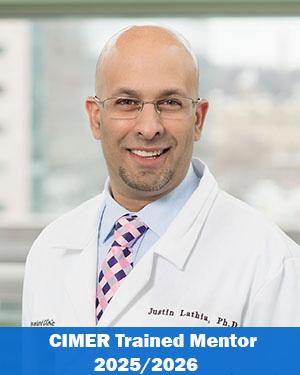Research News
05/12/2022
Dr. Justin Lathia Named One of Only Nine Recipients of National Research Program Award
Dr. Lathia has received an eight-year, $5.2 million award from the National Institute of Neurological Disorders and Stroke to further research into the dynamics of immune suppression in malignant brain tumors and target future immune-activating therapies.

Justin Lathia, PhD, Vice Chair of the Department of Cardiovascular & Metabolic Sciences, Co-director of the Center of Excellence in Brain Tumor Research and Therapeutic Development, and the Melvin H. Burkhardt Endowed Chair for Neuro-Oncology at Cleveland Clinic, is one of only nine recipients in America this year to receive a prestigious National Institute of Neurological Disorders and Stroke (NINDS) Research Program Award.
This grant will provide $5.2 million over eight years to further Dr. Lathia’s research into understanding how the microenvironment generates and maintains immune suppression to fuel the growth of malignant brain tumors.
“The nature of our work has been translational – involving assessment of human tumors to create hypotheses to be tested using models – and then validation in human samples, eventually leading to early phase clinical trials,” says Dr. Lathia. “This type of work requires a unique team-based approach and takes advantage of the collaborative strengths we have at Cleveland Clinic.”
The NINDS Research Program Award provides recipients with up to eight years of funding stability, facilitates flexible research environments and provides freedom for researchers to pursue long-term projects or embark on groundbreaking research.
Dr. Lathia and his team will use the grant to continue to explore the role that myeloid-derived suppressor cells (MDSCs) play in suppressing anti-tumor immunity. His team plans to use glioblastoma as a model for neurological disorders to identify the cellular and molecular mechanisms that control how MDSCs are formed and how they respond to microenvironmental cues. His research program aims to evaluate pre-clinical MDSC targeting in combination with immune-activating therapies.
“Glioblastoma has one of the most aggressive disease trajectories of any cancer. Recurrence is quite common, due in large part to major alterations in the immune system,” said Dr. Lathia. “As we try to harness the immune system for anti-cancer therapies, it’s critical we understand what underlies the immune response in tumors. Ultimately, this will guide more effective therapies for patients with the disease.”
Featured Experts
News Category
Related News
Research areas
Want To Support Ground-Breaking Research at Cleveland Clinic?
Discover how you can help Cleveland Clinic save lives and continue to lead the transformation of healthcare.
Give to Cleveland Clinic